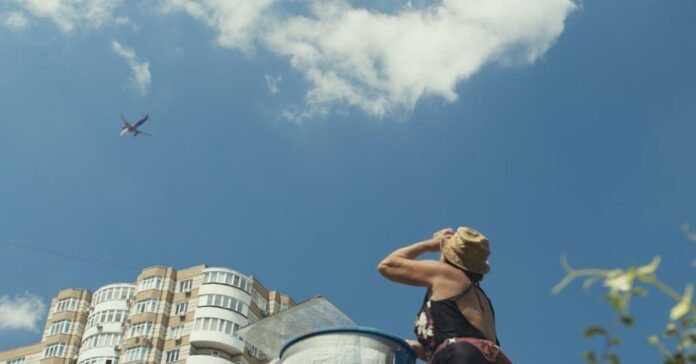Dir: Adelina Borets. Poland/Ukraine. 2024. 70mins
Amid all of the horror and lack of battle, Adelina Borets finds a inexperienced shoot of hope in Flowers Of Ukraine. Her first characteristic celebrates Kyiv resident Natalia, whose cheerful ongoing battle in opposition to property builders is dwarfed by the wrestle confronted by Ukraine when Russia invades in 2022. The modest working time, partaking central determine and recent perspective on latest occasions ought to make sure that competition invites bloom following screenings at Krakow and DOK Leipzig.
Natalia’s life involves signify the lifetime of Ukraine
Flowers Of Ukraine begins in Kiev, 2021, with an interesting imaginative and prescient of Natalia’s little piece of heaven on earth. Surrounded by towering tenement blocks and located subsequent to a carpark, Natalia presides over a leafy inexperienced patch that appears like a stretch of countryside within the coronary heart of the town. Chickens and goats roam freely, there are freshly-laid eggs to collect, tomatoes to select and cucumbers to pickle. It’s an idyllic imaginative and prescient of the great life the place the largest hazard comes from the goats who select to leap on the close by parked automobiles.
The summer season solar’s heat, the quiet hiss of sprinklers and photographs of crimson roses, closely laden raspberry bushes and ripening watermelons all contribute to a way of a paradise that we all know is about to change into endangered. Earlier than that, we achieve a greater understanding of Natalia, a lady of heat good humour and resilience. There’s something in her look and spirit that’s harking back to Agnes Varda. Surrounded by her household, together with two ex-husbands, Natalia has an urge for food for all times on her phrases and isn’t about to sacrifice her hard-won freedom or independence.
Borets builds a way of Natalia as somebody emblematic of Ukraine. Temporary glimpses of archive footage supply a reminder of Ukraine’s Declaration of Independence from Soviet rule in 1991. In her late 60s, Natalia is sufficiently old to recollect college classes that have been taught in Russian. She carries a sunny certainty about battles fought, victories achieved and points resolved. Issues begin to change when Natalia and her household obtain an eviction discover and a go to from Genadiy, a smooth-talking consultant of a growth firm whch actually needs to pave her paradise and put up a parking zone.
You assume Borets was initially interested in Natalia’s David vs. Goliath story as a fantastic story of a person staunchly resisting the blandishments of massive enterprise. Then, Putin’s invasion is unleashed. Martial legislation is imposed, shelters are constructed and bombs begin to fall. Circumstances change however, considerably, Natalia doesn’t, and Borets’ movie turns into an affidavit to her resilience as she constructs her personal bomb shelter, gives her providers to a territorial defence league, makes Molotov cocktails and decides to remain put. “I’m not working away,” she pronounces. “I’ve nowhere to run.”
Cinematographers Bohdan Rozumnyi and Bohdan Borysenko floor the movie within the altering seasons with photographs of snowy winter funerals, roses rotting within the autumn rain and marigold seeds being planted for one more 12 months. Natalia’s life involves signify the lifetime of Ukraine and the sense of group that’s all essential within the nation’s refusal to submit. Quite a lot of compositions by Ukrainian folks music quartet DakhaBrakha are successfully woven via the movie, underlining the emotional tug of solidarity.
There’s demise and sacrifice on this story, however Borets largely shies away from the grim realities of an ever lengthening battle. As an alternative, she chooses to stress hope in a surprisingly life-affirming documentary, endorsing the assumption that the whole lot can be effective so long as the flowers preserve blooming.
Manufacturing corporations: Gogol Movie, Koskino, DI Manufacturing facility
Worldwide gross sales: Gogol Movie movie@gogol.basis
Producers: Glib Lukianets, Natalia Grzegorzek
Screenplay: Adelina Borets, Glib Lukianets, Marta Molfar
Cinematography: Bohdan Rozumnyi, Bohdan Borysenko
Enhancing: Agata Cierniak, Mateusz Wojtynski
Music: DakhaBrakha
